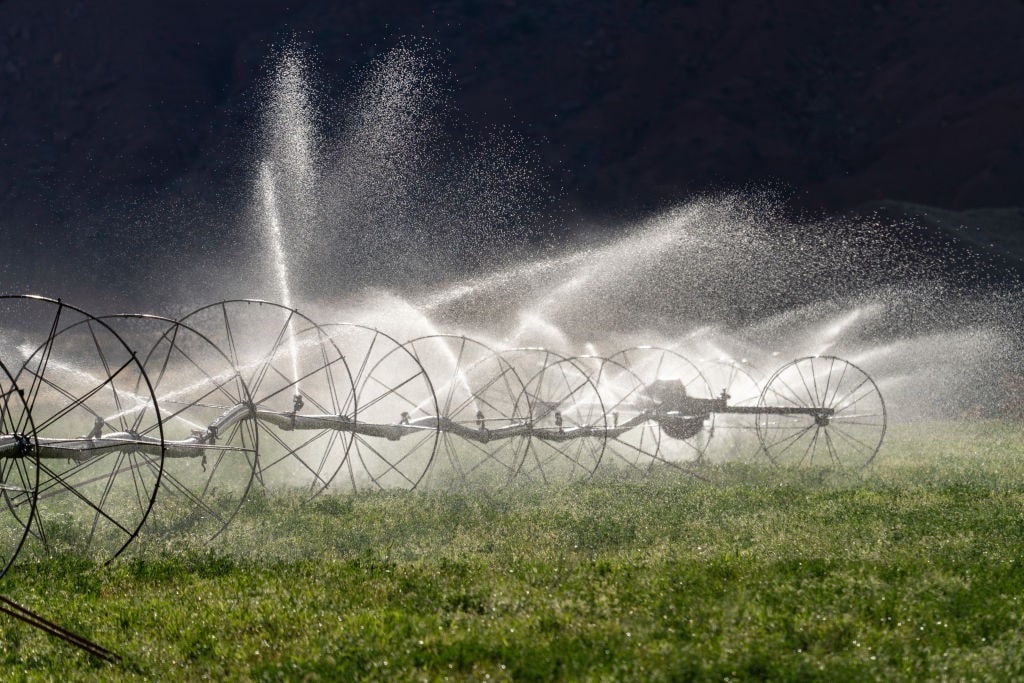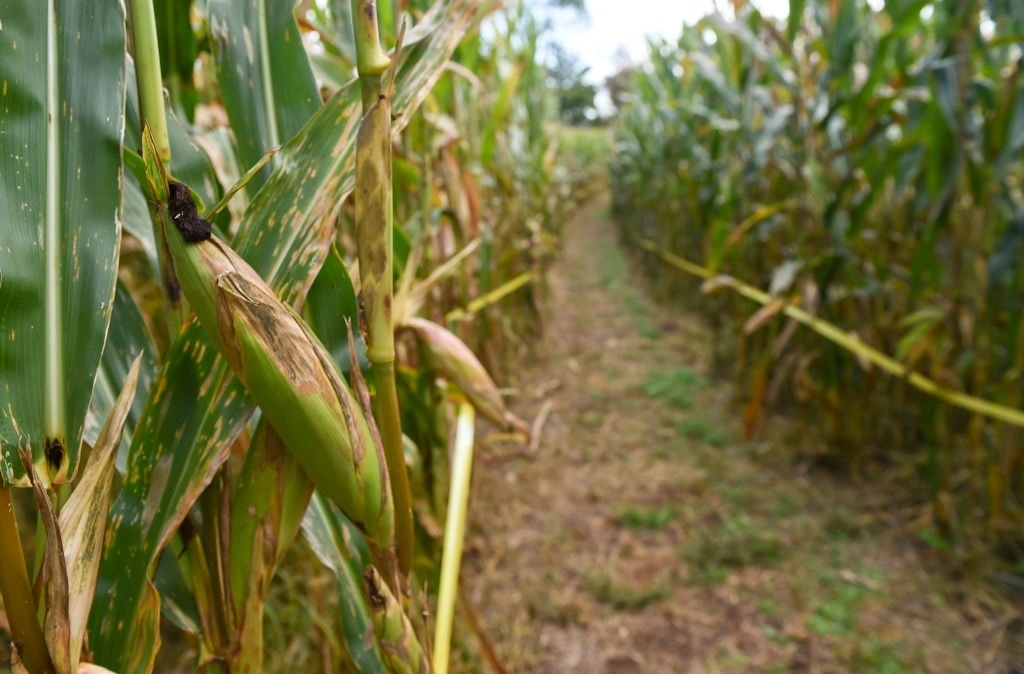Climate change activists increasingly target agriculture as a primary source of greenhouse gas emissions and pollution. Too often this translates into condemnation of gentle cows or the pleasures of meat-eating, instead of drawing attention to proper farming practices and land management. This is especially true with respect to water use and the ethanol industry.
Water in Agriculture
American agriculture has continued to be dominated by ever-larger farms and producers, increasing productivity and economic growth and amplifying vital water resources’ drawdowns. This is apparent in water-precious regions such as Arizona and California, but also includes Idaho’s exploding dairy industry and Arkansas’ astoundingly productive poultry economy.

(Photo by: Jon G. Fuller/VWPics/Universal Images Group via Getty Images)
Growing alfalfa for cows (or for export to China), and corn and soy for chickens, requires substantial amounts of water in addition to what is used for the animals themselves. Corn and soy require chemical applications that erode soils and contribute to water pollution. The larger the scale of operations, the more significant the environmental impacts – especially on water resources.
Food Versus Ethanol
Voices calling to curtail carnivorous dining are howling up the wrong cornstalk: Reassessing the impacts of ethanol production and livestock management methodology would leave the American palate intact. These are problems not of animal pollution but of animal husbandry and sensible land management.
The United States leads the world in biofuel production. Of the 92 million American acres planted to corn in 2023, approximately 40% will be processed into ethanol to meet subsidized mandates in Americans’ fuel blends. Ethanol incentives have pushed up corn prices, but also encouraged farmers to reduce lands used in (carbon-sequestering) conservation programs and expand corn cropping to less desirable soils and slopes. The combined effect is to make ethanol production a much less attractive environmental alternative than has been presented.
Corn Ethanol Is Environmentally Destructive
Corn is a particularly soil-draining crop. Most corn is now genetically modified for resistance to widely sprayed glyphosate, and the endocrine-disrupting herbicide atrazine is still used in its production. Neonicotinoids reputed to threaten bees and other wildlife are also standard tools in corn farming.
This makes fuels derived from corn dubious environmental saviors. One five-year study concluded in 2022 that corn ethanol led to at least 24% more emissions than gasoline:
“Our analyses show a modest change in the use of US agricultural land for crop production due to the RFS [Renewable Fuel Standards], which led to sizable increases in associated environmental impacts including nitrate leaching, phosphorus runoff, and soil erosion. While improvements in production efficiency have likely reduced the carbon intensity of corn ethanol since inception of the RFS, the previously underestimated emissions from US land conversion attributable to the policy are enough to fully negate or even reverse any GHG advantages of the fuel relative to gasoline. … [O]ur findings confirm that contemporary corn ethanol production is unlikely to contribute to climate change mitigation.”
Instead of forcing Americans to give up hamburgers, the reversal of the boondoggle ethanol program would free up some 36.8 million acres of land from corn cropping, eliminating the application of tons of chemicals and preserving vital water supplies. Liberating cows from confinement feed operations into rotational grazing on some of those formerly corn-sown lands would restore depleted soils, sequester carbon, and convert grasses to milk, cheese, and T-bones.
Biden’s Love of Ethanol
Instead, the Biden administration has favorably expanded ethanol use. In April 2022, the president extended the availability of higher biofuel blends to offset nosebleed gasoline prices. Reuters reported:
“The decision represents a win for the U.S. corn lobby by likely expanding demand for corn-based ethanol and a setback for oil refiners, which view ethanol as competition….
“Russia’s invasion of Ukraine and sanctions and boycotts that followed launched retail gasoline prices to record highs, a vulnerability for Biden’s fellow Democrats in November’s congressional elections.”
Then, in June 2023, the USDA announced “plans to invest up to $500 million from President Biden’s Inflation Reduction Act to increase the availability of domestic biofuels and give Americans additional cleaner fuel options at the pump.” Much of the announced funding is directed to ethanol production and distribution facilities. Notwithstanding the substantial environmental degradation inflicted by 36.8 million acres of industrially grown corn, the USDA claims this is “Through the Inflation Reduction Act, the Administration is delivering on its promise to fight climate change and reduce greenhouse gas emissions across America.”
Inflating gasoline prices through sloppy monetary policy and oil-stifling regulations and then faux-reducing them with ethanol is as useless as subsidizing polluting corn and calling it “clean energy.” This reflects a perversion of policy priorities, quickly remedied by reversing well-intentioned, but ultimately counterproductive, ethanol production. Taking tens of millions of acres out of corn cropping for ethanol would save a lot of water.




